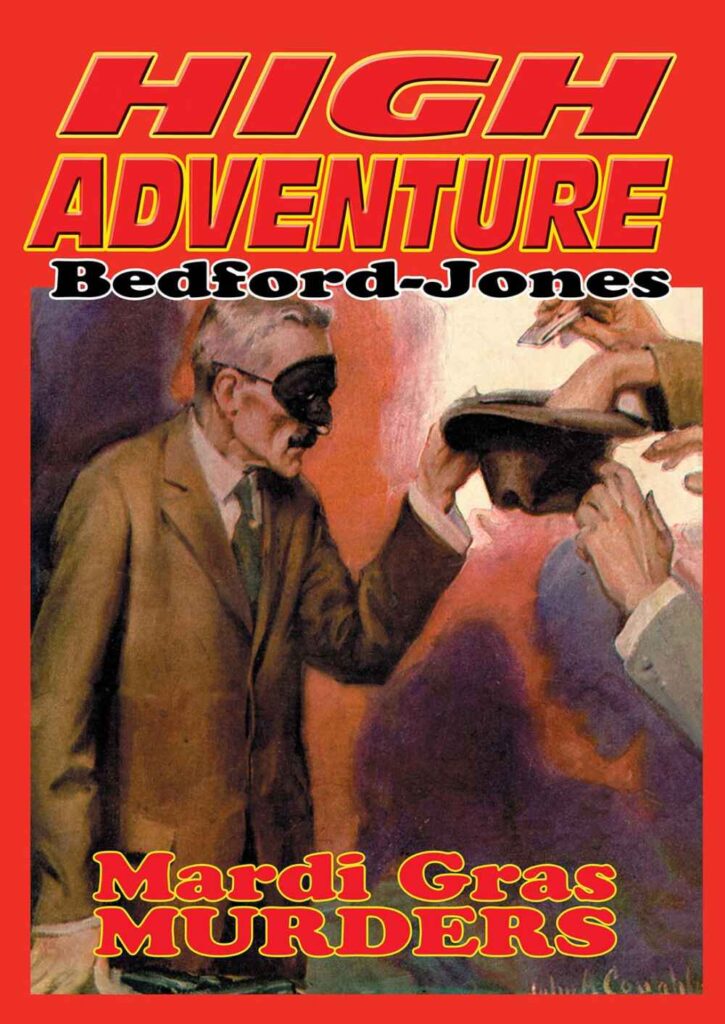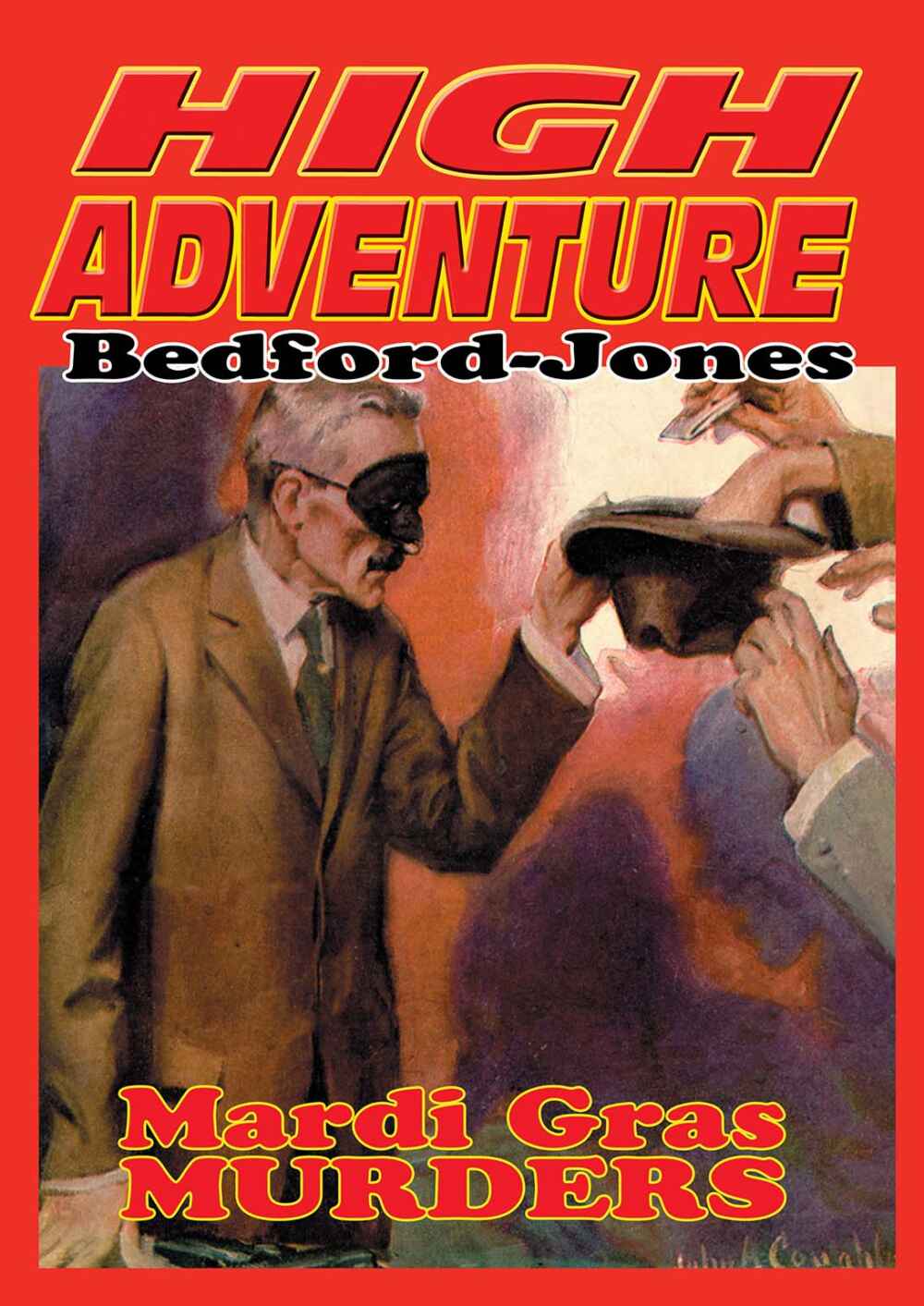Magazine Review: High Adventure #190: H. Bedford-Jones – Adventure edited by John P. Gunnison
This issue of the pulp reprint magazine collects three stories from the multiple typewriters of prolific author Henry James O’Brien Bedford-Jones (1887-1949). He was born in Canada, but moved to the United States in his teens and became a naturalized citizen in 1908. Between getting his nearly two hundred novels, four hundred novelettes, and eight hundred short stories published, he was a journalist and poet. Wow.

“The Mardi Gras Mystery” from the August 1920 issue of Short Stories leads off with a tale set in and near New Orleans. We begin in the last few days of the Mardi Gras season, which as the author reminds us begins on January 6th and runs until Fat Tuesday with a succession of balls, parties, and in the last weeks parades. This season has been unusual in that a number of the masques have been interrupted by a fellow nicknamed the Midnight Masquer, who strikes at two minutes to midnight dressed in the costume of an aviator and robs party guests of cash and valuables.
The story primarily follows the activities of three people. First is Jachin Fell, a mild-mannered bachelor of a certain age who despite being somewhat retiring is high in New Orleans society, serving with the Krewe of Comus, one of the most exclusive Mardi Gras clubs. He is listed as a lawyer, having passed the bar, though no one can ever recall him taking a case or filing a brief. Mr. Fell has an avuncular interest in the next character.
Lucie Ledanois is the last of her once prominent and wealthy family. Her father spent the remnants of the ancestral money in vain attempts to revive his fortunes before dying a few years ago. As she was still a minor, Lucie fell under the guardianship of a distant relative, wealthy but rather cold businessman Joseph Maillard. Mrs. Maillard rather lorded it over poor relation Lucie, while their son Bob has shown a strong interest in marrying her–whether Lucie likes him back or not. Joseph Maillard sold some of Lucie’s remaining land holdings a year or so back to pay interest on her debts, only to have oil then discovered on that land. Was it a mistake, or deliberate mismanagement, as he’s a stockholder in the oil company? While Lucie’s father was alive, she had met and rather admired the third main character.
Henry Gramont was the rightful heir to a princely title, though he as a good American has renounced it. A veteran of the Great War, Henry served as a captain in the Army Air Corps. While not particularly wealthy, he is reasonably well off and a trained geologist, so his prospects are good. Henry has a distinct romantic interest in Lucie but primarily just wants her to be happy.
The action kicks off with a masque at the Maillard home, which is robbed by the Midnight Masquer. The clever fellow waited until two minutes after the hour to throw everyone off. Jachin is one of those robbed, though he saw this coming and only has to cough up a ten dollar bill. He figures out one of the Masquer’s tricks.
But uncovering the identity of the Midnight Masquer turns out not to be the mystery of the title. The very next chapter tells us who the mysterious robber is, and his motives. He makes restitution, and all seems well.
Until Fat Tuesday, when the Midnight Masquer strikes again, this time committing murder. Or is it an imposter?
A few more murders follow, and multiple red herrings, as both Mr. Fell and Mr. Gramont have secrets they’re keeping. A complex web of land fraud, car theft rings, and numbers rackets make things even more confusing. The important question is, will Lucie come out of this okay?
The ending is unnecessarily drawn out to make it look like crime will pay after all, but this isn’t noir.
“Yellow Intrigue” from the March 2021 issue of Short Stories, takes us to China. Sam Breck is a mercenary in the service of the Sun Yat-Sen-led faction of the Republic of China, helping them against the Japanese-influenced faction trying to establish rule from Pekin (modern-day Beijing). His primary assignment at the moment is building an airfield near the inland city of Cheng-tu (modern Chengdu.)
Breck is surprised to be hailed by his old college professor, Alan Groot. It seems the linguist has been invited by the Pekin government to study the history of Chinese languages, and is staying at a Taoist temple nearby with his niece Mary.Fisher. Oh, and there’s a Russian nobleman staying there too, a Count Rosoff. Groot is in town to buy a rare manuscript.
Breck recognizes that the person selling the manuscript is actually Korean, not a local, and decides something is fishy. He accompanies Groot back to the temple, along the way meeting a dying man, one of his best agents. This man confirms something is up at the temple and Breck finds an odd necklace in his possession.
Count Rosoff turns out to be a Germanophile who had to flee his native Russia when the Bolsheviks took over. He considers the Sun Yat-Sen faction to be communistic, and is conspiring to assist the Prussianized Japanese military in controlling China. Mary turns out to be a plucky and attractive young woman who helps Breck and Groot escape the temple in an exciting boat chase.
“The Pearl of Price” appeared in the March 1933 issue of Blue Book Magazine. Former pearl seeker Cap’n Carson has now made his fortune and sails the South Pacific in his fine schooner Nautilus for reasons of his own (never actually revealed.) At the tail end of a typhoon, his ship picks up the sole survivor of a small boat, a beautiful woman named Helga Skyborg.
She’s the daughter of his old partner Cap’n Skyborg, who was murdered by his new partners Maguire and Benders when they found a rich pearl oyster bed at the isolated Hermes Reefs. Helga would like to get back at least her father’s ship, as it is now hers. (To Carson’s surprise, she has her master’s license.)
Carson agrees to help her, but it’s going to be a hard battle, as Maguire and Benders are desperate men. There will be losses by the end of this story.
Bedford-Jones was good at his craft, and these are all exciting stories–though there are certain obvious patterns. The first story is novella length, so has the best depth of character. Mary’s the best of the heroines, much more actively involved in her story.
Content note: Period racism and sexism in all the stories. The former is especially noticeable in the second story. Breck was raised in China, and likes the Chinese people (and to an extent the Japanese people) but uses outdated language and clearly expects to be in charge, uplifting them. There’s even a N-word in passing.
Exciting, fun stories, but the baked in racism may make them a hard pass for some readers.

